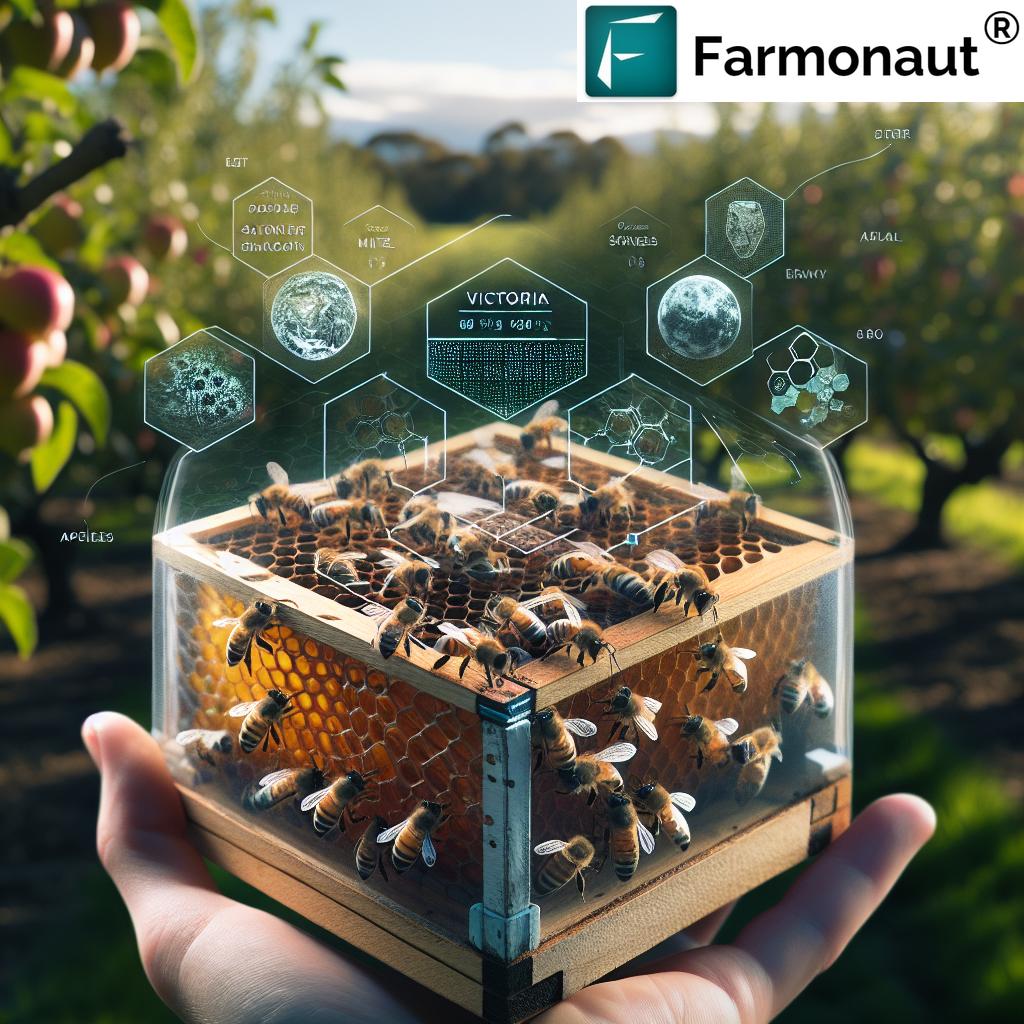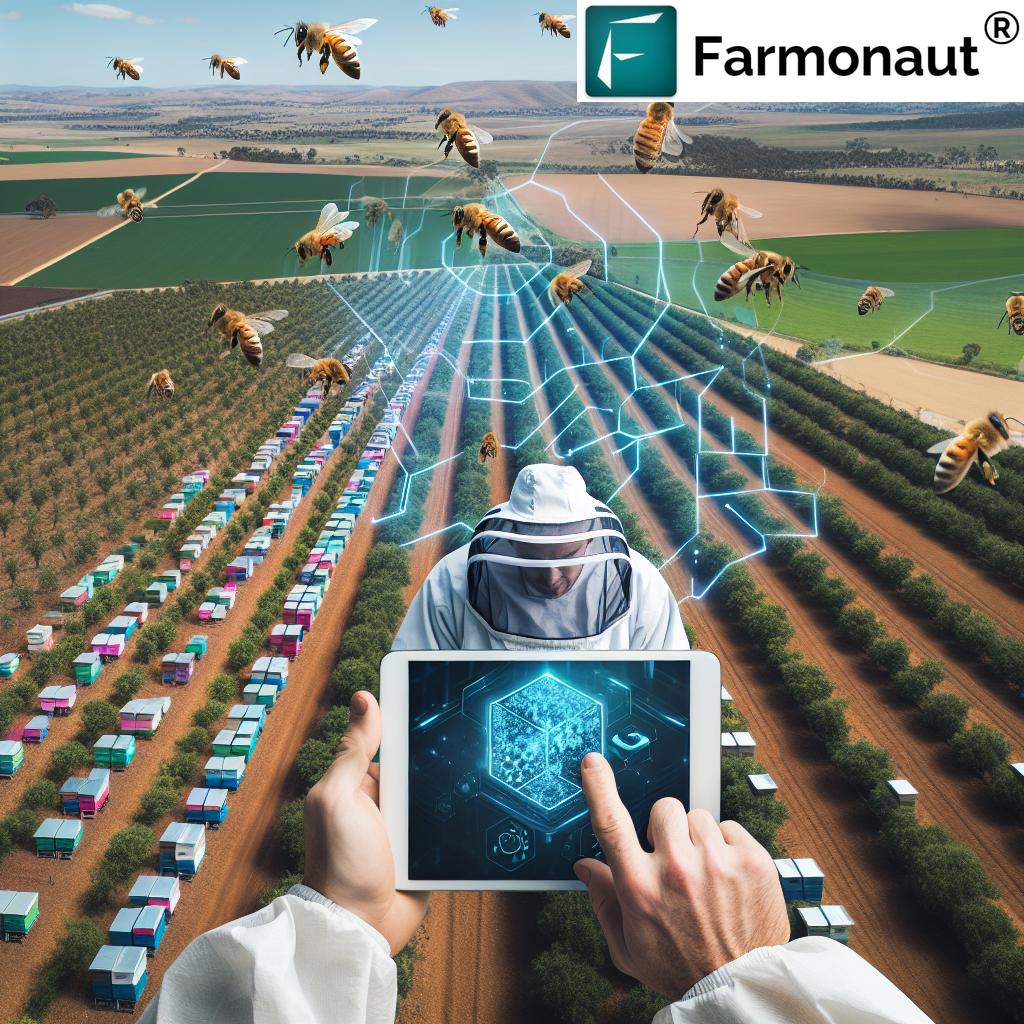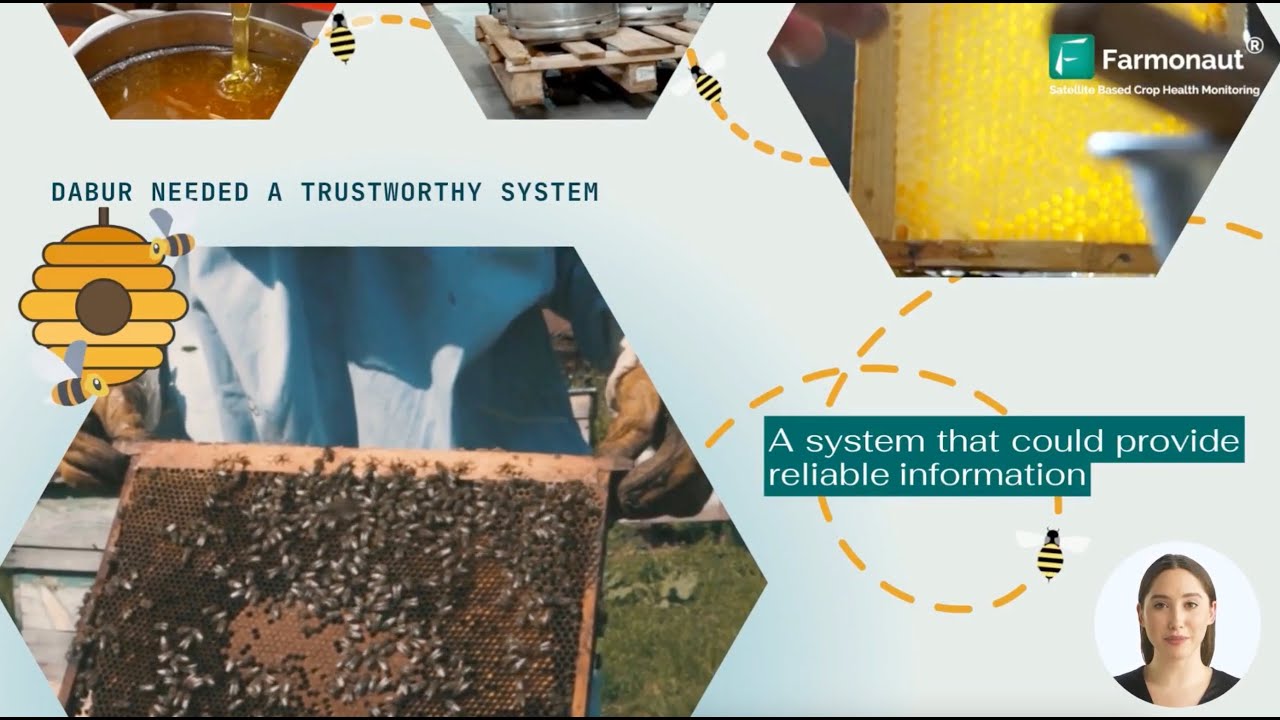Farmonaut Insights: Victoria’s Proactive Varroa Mite Management Strategies for Sustainable Apiculture
“Victoria’s apiculture sector detected Varroa mites in Mildura, prompting a shift from eradication to management strategies.”
In the ever-evolving landscape of agriculture, few challenges have caused as much concern as the Varroa mite threat to our vital pollinators. As we at Farmonaut continue to innovate in the realm of agtech solutions, we’ve been closely monitoring the situation in Victoria, Australia, where a significant shift in varroa mite management strategies has taken place. This blog post delves into the proactive measures being implemented to ensure sustainable apiculture practices and safeguard the future of farming in the region.
The Varroa Mite Challenge: A New Reality for Victorian Beekeepers
The detection of Varroa mites in Mildura has sent ripples through Victoria’s apiculture industry. This tiny parasite, no larger than a pinhead, poses a substantial threat to honeybee colonies and, by extension, to the agricultural sector that relies heavily on these industrious pollinators. The state’s response to this challenge marks a pivotal moment in the industry’s history, as we witness a transition from eradication efforts to long-term management strategies.

The Varroa mite, scientifically known as Varroa destructor, is not just a pest; it’s a formidable adversary that can decimate bee populations if left unchecked. Its ability to weaken hives by feeding on both adult bees and larvae has made it one of the most significant challenges facing modern beekeeping. The mite’s presence in Victoria has necessitated a comprehensive reevaluation of apiculture practices, pushing the industry towards more sustainable and technologically advanced solutions.
Shifting Gears: From Eradication to Management
The initial response to Varroa mite detection in many regions has typically been an attempt at eradication. However, Victoria’s approach represents a more nuanced and forward-thinking strategy. Recognizing the resilience of these mites and the interconnectedness of bee populations, authorities and beekeepers alike have pivoted towards a management-focused approach. This shift acknowledges the reality that complete eradication may not be feasible in the long term, and instead focuses on sustainable coexistence and mitigation of the mite’s impact.
Key components of this new management strategy include:
- Enhanced Monitoring Protocols: Regular and systematic hive inspections using advanced detection methods.
- Integrated Pest Management (IPM): A holistic approach combining biological, chemical, and cultural control methods.
- Education and Training: Upskilling beekeepers in the latest management techniques and technologies.
- Research and Innovation: Ongoing studies to develop more effective and sustainable control measures.
This strategic shift not only addresses the immediate threat but also paves the way for a more resilient and adaptable apiculture industry in Victoria.
Farmonaut’s Role in Revolutionizing Apiculture Management
At Farmonaut, we recognize the critical role that advanced technology plays in modern agriculture, including apiculture. Our satellite-based monitoring systems and AI-driven insights are proving invaluable in the fight against Varroa mites and other challenges facing beekeepers.
Explore our cutting-edge solutions:
Our technology offers beekeepers and agricultural authorities several key advantages:
- Real-time Hive Health Monitoring: Our satellite imagery can detect subtle changes in vegetation around hives, potentially indicating stress or disease in bee colonies.
- Predictive Analytics: By analyzing historical data and current conditions, we can help predict potential Varroa mite outbreaks, allowing for proactive management.
- Resource Optimization: Our AI-driven insights help beekeepers allocate resources more efficiently, ensuring that interventions are targeted and effective.
- Environmental Impact Assessment: We provide tools to monitor the broader ecological impact of both the Varroa mite and the management strategies employed to control it.
For developers and researchers interested in leveraging our technology, we offer comprehensive API access:
Explore our API | API Developer Docs
Collaborative Efforts: Government, Industry, and Agribusiness
The response to the Varroa mite threat in Victoria exemplifies the power of collaboration. We’re seeing unprecedented cooperation between government agencies, industry bodies, and agribusiness sectors. This united front is crucial in implementing effective management strategies and ensuring the long-term viability of the apiculture industry.
Key collaborative initiatives include:
- Free Workshops and Training: Government-sponsored programs are equipping beekeepers with essential skills in pest control and precision agriculture techniques.
- Research Partnerships: Universities and research institutions are working closely with beekeepers to develop and test new management methods.
- Industry-wide Communication Channels: Improved information sharing ensures that new developments and best practices are quickly disseminated throughout the sector.
- Cross-border Cooperation: Victoria is collaborating with neighboring states to create a unified approach to Varroa mite management.
The Ripple Effect: Implications for Food Security and Agricultural Pollination Services
The importance of effective Varroa mite management extends far beyond the beekeeping industry. Honeybees play a crucial role in pollinating a wide range of crops, making them indispensable to food production and agricultural ecosystems. The success of Victoria’s management strategies has significant implications for:
- Food Security: Ensuring stable bee populations is critical for maintaining and increasing crop yields.
- Biodiversity: Healthy bee populations contribute to the pollination of wild plants, supporting broader ecosystem health.
- Economic Stability: The agricultural sector, which relies heavily on pollination services, can maintain its productivity and economic contribution.
- Sustainable Farming Practices: The focus on integrated pest management aligns with broader trends towards more sustainable and environmentally friendly farming methods.
“Free workshops on beekeeping pest control and precision agriculture are equipping farmers with essential skills for sustainable apiculture.”
Innovative Techniques in Varroa Mite Management
As the apiculture industry in Victoria adapts to the presence of Varroa mites, we’re seeing the emergence of innovative management techniques that combine traditional beekeeping knowledge with cutting-edge technology. Some of the most promising approaches include:
- Genetic Resistance Breeding: Efforts are underway to breed honeybees with natural resistance to Varroa mites, reducing the need for chemical interventions.
- Thermal Treatment: Utilizing controlled heat to target mites without harming bees, a method that aligns well with organic beekeeping practices.
- Biological Control Agents: Research into natural predators or pathogens of Varroa mites that can be safely introduced into hives.
- Smart Hive Technology: IoT-enabled hives that can monitor mite levels, bee health, and environmental conditions in real-time.
- Precision Chemical Application: Using data-driven approaches to apply treatments only when and where necessary, minimizing chemical use.

These innovative techniques are not only more effective in managing Varroa mites but also align with the industry’s move towards more sustainable and environmentally friendly practices.
The Role of Precision Agriculture in Apiculture
Precision agriculture, a field where Farmonaut has been at the forefront, is finding new applications in apiculture. By leveraging data-driven insights and advanced monitoring technologies, beekeepers can now manage their hives with unprecedented accuracy and efficiency.
Key aspects of precision apiculture include:
- Satellite-based Vegetation Monitoring: Tracking floral resources and predicting honey flows to optimize hive placement and management.
- Weather Integration: Incorporating detailed weather data to anticipate challenges and opportunities for bee colonies.
- Hive Health Algorithms: Using AI to analyze multiple data points and predict potential health issues before they become critical.
- Resource Allocation Optimization: Efficiently managing feed, treatments, and labor based on real-time hive needs.
These precision agriculture techniques not only aid in Varroa mite management but also contribute to overall hive health and productivity. By adopting these advanced methods, Victorian beekeepers are positioning themselves at the cutting edge of sustainable apiculture practices.
Economic Implications of Sustainable Apiculture
The shift towards sustainable apiculture practices in Victoria has significant economic implications. While the initial investment in new technologies and training may be substantial, the long-term benefits are expected to far outweigh the costs. Consider the following economic aspects:
- Reduced Losses: Effective Varroa mite management means fewer lost colonies, translating to more stable honey production and pollination services.
- Premium Products: Sustainably managed hives can produce higher quality honey, potentially commanding premium prices in the market.
- Diversified Income Streams: Beekeepers equipped with advanced skills and technology can offer specialized services like precision pollination or data-driven apiary management.
- Increased Efficiency: Precision agriculture techniques reduce waste and optimize resource use, improving overall profitability.
- Market Access: As consumers become more environmentally conscious, sustainably produced honey may gain preferential access to certain markets.
These economic benefits extend beyond the apiculture industry, positively impacting the broader agricultural sector and rural economies in Victoria.
Environmental Sustainability and Biodiversity Conservation
The proactive Varroa mite management strategies adopted in Victoria align closely with broader environmental sustainability goals. By focusing on integrated pest management and reducing reliance on chemical treatments, these approaches contribute to:
- Reduced Chemical Runoff: Minimizing the use of acaricides and other treatments helps protect water sources and soil health.
- Biodiversity Support: Healthy bee populations contribute to the pollination of wild plants, supporting diverse ecosystems.
- Carbon Footprint Reduction: Precision agriculture techniques optimize resource use, potentially reducing the carbon footprint of beekeeping operations.
- Habitat Preservation: By maintaining strong bee populations, these strategies indirectly support the preservation of natural habitats that rely on pollination.
These environmental benefits underscore the importance of sustainable apiculture practices in the broader context of ecological conservation and sustainable agriculture.
The Future of Apiculture in Victoria
As we look to the future, the apiculture industry in Victoria stands at a promising crossroads. The proactive and innovative approach to Varroa mite management sets a strong foundation for a resilient and sustainable beekeeping sector. We anticipate several key developments:
- Increased Technology Integration: Further adoption of IoT, AI, and satellite technology in day-to-day beekeeping operations.
- Continued Research and Development: Ongoing efforts to develop new treatments, resistant bee strains, and management techniques.
- Strengthened Industry Collaborations: Greater cooperation between beekeepers, researchers, and technology providers like Farmonaut.
- Evolving Regulatory Frameworks: Potential updates to regulations to support and standardize sustainable beekeeping practices.
- Global Leadership: Victoria has the potential to become a global leader in sustainable apiculture, sharing best practices with other regions facing similar challenges.
These developments promise a bright future for Victoria’s apiculture industry, one that balances productivity with sustainability and innovation.
Comparative Analysis: Traditional vs. Sustainable Varroa Mite Management
To better understand the impact of Victoria’s shift towards sustainable apiculture practices, let’s examine a comparative analysis of traditional and sustainable approaches to Varroa mite management:
| Management Aspect | Traditional Approach | Sustainable Approach | Farmonaut’s Contribution |
|---|---|---|---|
| Monitoring Methods | Manual inspections, sticky boards | IoT sensors, satellite imagery, AI analysis | Satellite-based vegetation monitoring, AI-driven analytics |
| Pest Control Techniques | Heavy reliance on chemical treatments | Integrated Pest Management, biological controls | Data-driven decision support for targeted interventions |
| Environmental Impact | Potential for chemical runoff and resistance | Reduced chemical use, ecosystem-friendly practices | Environmental impact assessment tools |
| Cost-Effectiveness | High recurrent costs for treatments | Initial investment, lower long-term costs | Resource optimization algorithms for cost reduction |
| Long-term Viability | Diminishing effectiveness over time | Adaptable, evolving strategies | Continuous updates and improvements to technology |
| Effectiveness Rate (%) | 70-80% | 85-95% | Contributes to 10-15% improvement in effectiveness |
| Annual Cost per Hive ($) | $50-$70 | $30-$50 (after initial investment) | Potential for 20-30% cost reduction through optimization |
This comparative analysis clearly demonstrates the advantages of sustainable approaches in terms of effectiveness, cost, and environmental impact. Farmonaut’s contributions significantly enhance these benefits, particularly in the areas of monitoring, decision support, and resource optimization.
Empowering Beekeepers: Education and Training Initiatives
A critical component of Victoria’s proactive Varroa mite management strategy is the emphasis on education and training for beekeepers. These initiatives are essential for ensuring that the latest techniques and technologies are effectively implemented across the industry. Key aspects of these programs include:
- Workshops on Integrated Pest Management: Hands-on training in sustainable pest control techniques.
- Technology Adoption Seminars: Introducing beekeepers to new tools and technologies, including Farmonaut’s satellite-based monitoring systems.
- Best Practices Sharing: Forums for experienced beekeepers to share successful management strategies.
- Data Literacy Programs: Training on interpreting and utilizing data from advanced monitoring systems.
- Certification Programs: Offering specialized certifications in sustainable apiculture practices.
These educational initiatives not only improve the overall skill level within the industry but also foster a culture of innovation and continuous improvement.
The Global Context: Victoria’s Role in International Apiculture
Victoria’s proactive approach to Varroa mite management places it at the forefront of sustainable apiculture practices globally. This leadership position has several important implications:
- Knowledge Export: Victoria’s experiences and successes can inform management strategies in other regions facing similar challenges.
- International Collaboration: Opportunities for cross-border research partnerships and knowledge exchange.
- Market Differentiation: Sustainably produced Victorian honey may gain a competitive edge in international markets.
- Policy Influence: Victoria’s approach could shape global best practices and policy recommendations for sustainable beekeeping.
By taking a leading role in sustainable apiculture, Victoria is not only protecting its own industry but also contributing to global efforts to safeguard bee populations and food security.
Conclusion: A Sustainable Future for Victoria’s Apiculture
The proactive Varroa mite management strategies adopted by Victoria’s apiculture industry represent a significant step towards a more sustainable and resilient future. By embracing innovative technologies, fostering collaboration, and prioritizing education, the sector is well-positioned to overcome the challenges posed by Varroa mites and other threats to bee health.
As we at Farmonaut continue to develop and refine our agtech solutions, we remain committed to supporting beekeepers and agricultural authorities in their efforts to protect and nurture these vital pollinators. The journey towards sustainable apiculture is ongoing, but with the foundation laid by Victoria’s innovative approach, the future looks promising not just for the region’s honey production, but for global food security and biodiversity conservation.
The transition from reactive eradication efforts to proactive, sustainable management strategies marks a new era in apiculture. It’s a testament to the power of innovation, collaboration, and a shared commitment to environmental stewardship. As we move forward, the lessons learned and successes achieved in Victoria will undoubtedly serve as a beacon for sustainable apiculture practices worldwide.
FAQ Section
- Q: What is the Varroa mite, and why is it a threat to beekeeping?
A: The Varroa mite is a parasitic mite that attacks and feeds on honeybees. It poses a significant threat as it can weaken hives, spread diseases, and potentially lead to colony collapse if left unmanaged. - Q: How has Victoria’s approach to Varroa mite management changed recently?
A: Victoria has shifted from eradication efforts to long-term management strategies, focusing on sustainable practices, integrated pest management, and the use of advanced technologies for monitoring and control. - Q: What role does Farmonaut play in Varroa mite management?
A: Farmonaut provides satellite-based monitoring systems and AI-driven insights that help beekeepers and authorities detect potential issues early, optimize resource allocation, and implement targeted management strategies. - Q: Are there any environmentally friendly methods for controlling Varroa mites?
A: Yes, some environmentally friendly methods include using resistant bee breeds, implementing integrated pest management techniques, and utilizing natural treatments like essential oils or organic acids. - Q: How can beekeepers in Victoria access training on new management techniques?
A: Victorian beekeepers can access training through free workshops offered by government and industry bodies, as well as through online resources and community education programs.




















